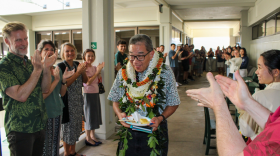Herb Lee Jr. grew up just up the street from the Waikalua Loko fishpond in Kāneʻohe. But it wasn’t until his 40s that he started to connect with the land.
“I had really no idea in looking back on it 27 years later,” he said, “how rich of an experience it would become and how transformative it has been for my life and my family.”

Lee is the president and CEO of the Pacific American Foundation. It’s a nonprofit that cares for and preserves the 400-year-old fishpond while offering ʻāina-based education to thousands of students.
He and his team are part of a group of Native Hawaiian organizations selected for the Historic Hawaiʻi Foundation’s inaugural stewardship training cohort.
The program was recently launched to help Native Hawaiian organizations build capacity and provide training tailored to each group’s needs and goals, said Kiersten Faulkner, Historic Hawaiʻi’s executive director.
“I so enjoy hearing the stories of a place and the deep knowledge and the ways that these places have supported communities for centuries,” she said. “And to be able to have even a small part in that is incredibly meaningful."
They selected three groups in July and plan to begin the program this month. It is funded by more than $500,000 in grant money. That includes about $75,000 from the Hawaiʻi Tourism Authority and $450,000 from the NATIVE Act, a federal program that seeks to help Native Hawaiian and Native American communities create and expand cultural tourism opportunities.
Historic Hawaiʻi’s first cohort will span 18 months. After that, Faulkner said they will start training more groups through 2026.
“In addition to helping this first cohort, we’re really hoping to set up a model and a framework for how stewardship programs can work kind of across the board,” she said.

Lee Jr. said they want to invite visitors to join the experience at the fish pond. It’s something he said he hopes to learn more about from the program. He said he was inspired to do this after learning more about regenerative tourism.
“Learning to me is reciprocal. We have something to share and hopefully we have something to learn,” he said. “I believe that when I, as a visitor, go to other places, I hopefully would like to go and not just be a passive visitor but to give back something to the place that I’m visiting.”
Another participating organization is Kauluakalana. They take care of the Ulupō heiau and Kawainui fishpond in Kailua.
Kaleo Wong, the group’s executive director, said they hope to expand their place-based learning and workforce-development programs. When Wong first started this work in 2015, he said there weren't any formal education programs. Since then, they’ve grown to serve about 3,000 to 5,000 people every year. And most of them are students.
“There’s this big need for spaces like this within our community, for kids to come out of the classroom and continue their learning on ʻāina, on lands, in ways that you can’t develop within the classroom,” he said. “So we see this need, and we see this want, and we see our program continuing to grow.”




